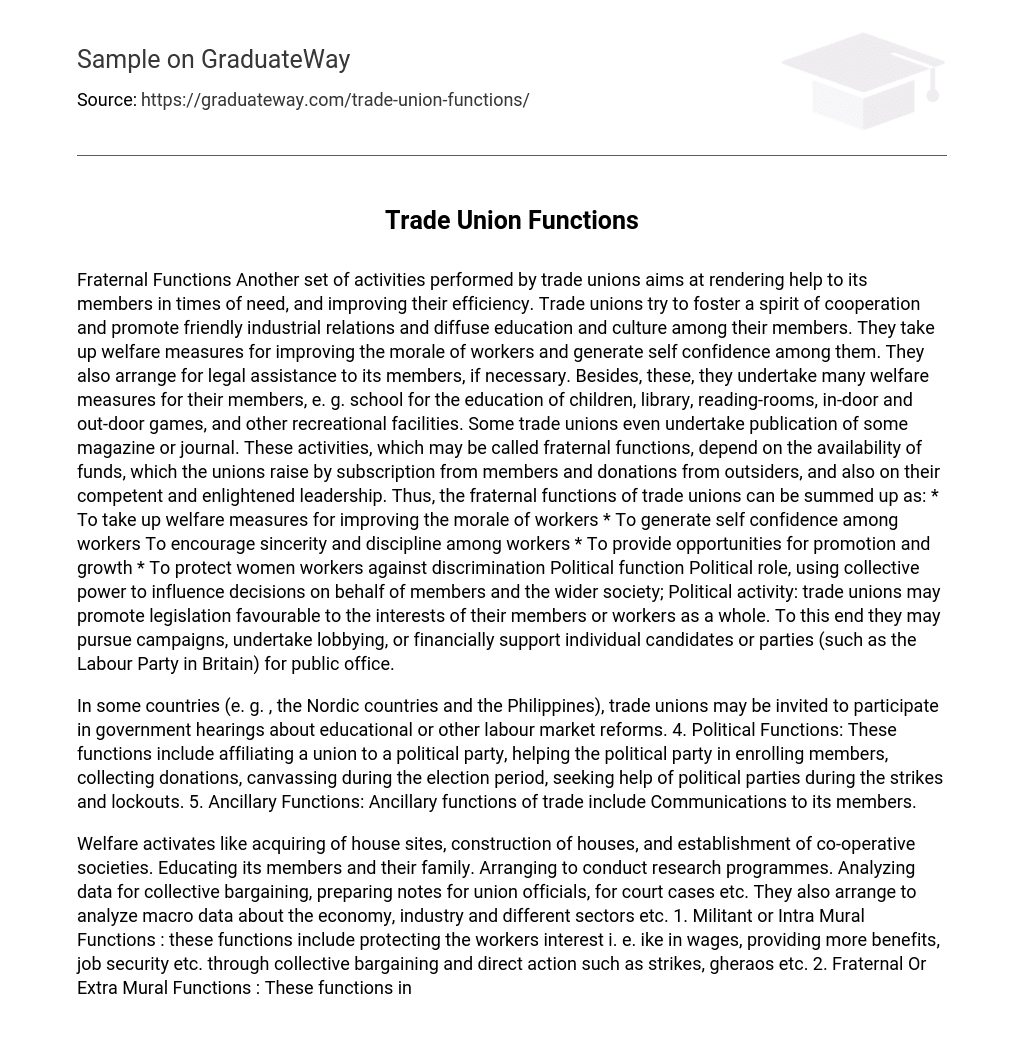Trade unions aim to cultivate a sense of cooperation and enhance amicable industrial relationships. They also strive to spread education and culture among their members in order to improve overall welfare. Additionally, trade unions work towards boosting worker morale and instilling self-confidence in them. They provide legal assistance whenever required. Moreover, trade unions undertake various welfare initiatives for their members, such as establishing schools for children’s education, libraries, reading rooms, indoor and outdoor games facilities, and other recreational amenities.
Trade unions often publish magazines or journals as part of their fraternal functions. These activities rely on funds raised through member subscriptions and external donations, as well as competent and enlightened leadership within the unions.
- To take up welfare measures for improving the morale of workers
- To generate self confidence among workers
- To encourage sincerity and discipline among workers
- To provide opportunities for promotion and growth
- To protect women workers against discrimination
Trade unions use their collective power to influence decisions that impact their members and society. They engage in political activities, like advocating for legislation that benefits workers. Trade unions conduct campaigns, lobby, and financially support candidates or parties running for public office, such as the Labour Party in Britain.
In some countries, like the Nordic countries and the Philippines, trade unions may be requested to take part in government hearings related to educational or labor market reforms.
Political Functions: The political functions involve a range of activities, including linking a union with a political party, aiding in member recruitment, gathering contributions, participating in election campaigns, and seeking assistance from political parties during strikes and lockouts.
Ancillary functions of trade encompass a range of activities, such as member communication, welfare initiatives (such as acquiring house sites and constructing houses), establishing co-operative societies, educating members and their families, conducting research programs, analyzing data for collective bargaining and preparing notes for union officials and court cases. They also analyze macro data pertaining to the economy, industry, and various sectors.
Militant or Intra Mural Functions: These functions involve safeguarding the workers’ interests, like wages, benefits, and job security. This is achieved through collective bargaining and direct actions such as strikes and gheraos.
Fraternal or extra mural functions involve offering both financial and nonfinancial support to employees in various situations, such as strikes, lockouts, medical needs, sickness, and accidents. These functions also encompass providing educational opportunities, recreation options, housing facilities, and social or religious benefits.
Militant Functions
Trade unions actively work to enhance the circumstances of their members in relation to employment. Their efforts include ensuring fair wages, better working conditions, improved treatment from employers, and other similar objectives. In cases where collective bargaining and negotiations fail to achieve these goals, unions may employ tactics like go-slow actions, strikes, boycotts, gheraos, and other measures to confront management.
Therefore, the aforementioned functions performed by trade unions are referred to as militant or fighting functions. To summarize, the militant functions of trade unions encompass:
- To achieve higher wages and better working conditions
- To raise the status of workers as a part of industry
- To protect labors against victimization and injustice
Trade unions engage in various activities to support their members and enhance their productivity. These activities include providing assistance to members during difficult times and improving their efficiency. Trade unions strive to foster cooperation, promote friendly relations in the workplace, and encourage education and culture among their members. They implement welfare measures to boost worker morale and instill self-confidence. Additionally, trade unions offer legal aid as needed. Moreover, they implement numerous welfare initiatives for their members, such as operating schools for children’s education, libraries, reading rooms, indoor and outdoor games facilities, and other recreational amenities. Furthermore, some trade unions even publish magazines or journals.
Trade unions engage in activities known as fraternal functions, which rely on funds gathered through member subscriptions and external donations, as well as competent and enlightened leadership. Overall, these fraternal functions can be summarized as follows:
- To take up welfare measures for improving the morale of workers
- To generate self confidence among workers
- To encourage sincerity and discipline among workers
- To provide opportunities for promotion and growth
- To protect women workers against discrimination.





